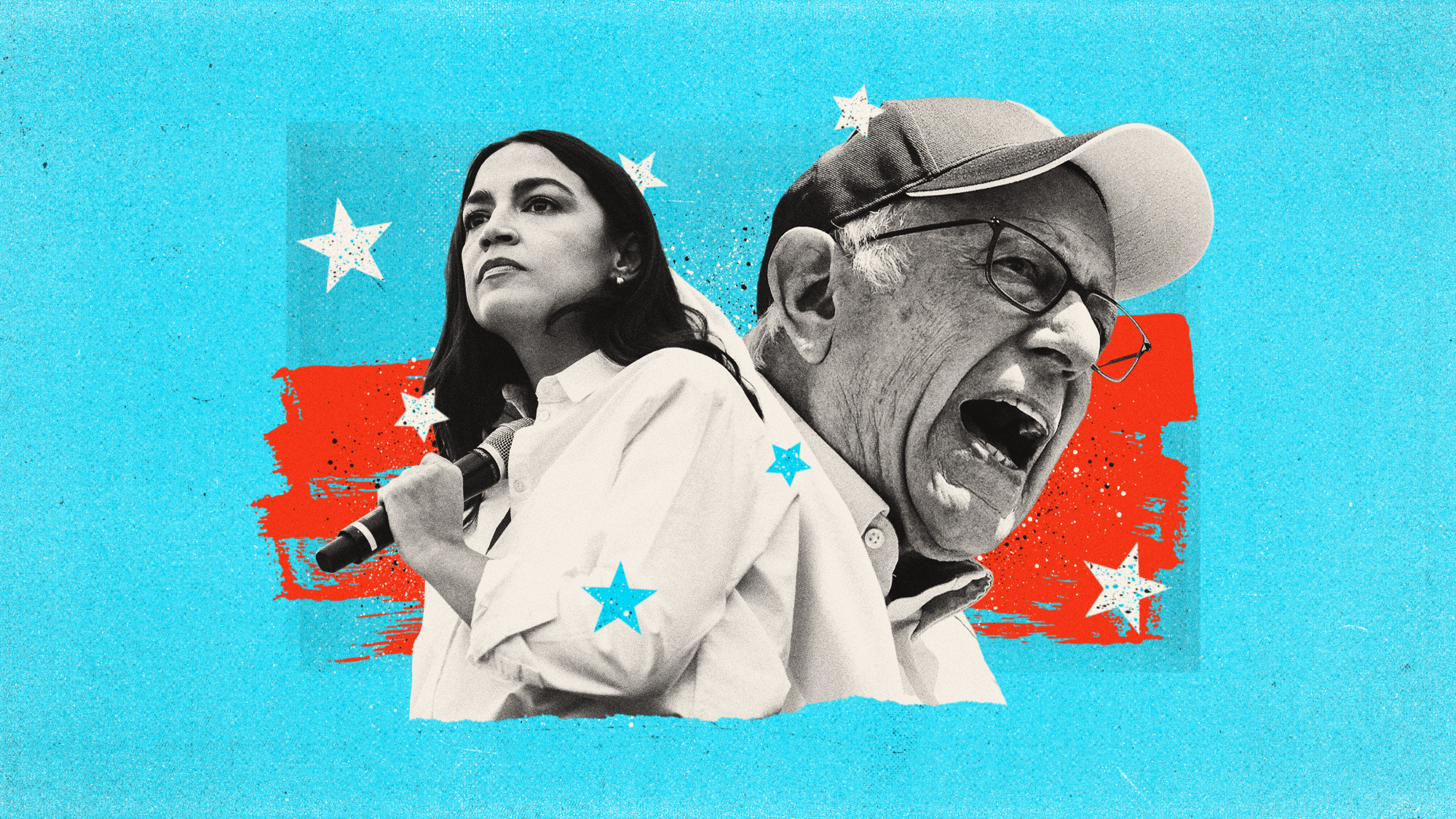Bernie Sanders' plan to rebuild labor unions would be a huge win for working Americans
Make violating labor law illegal again


A free daily email with the biggest news stories of the day – and the best features from TheWeek.com
You are now subscribed
Your newsletter sign-up was successful
David Portnoy, the founder of the fratty oaf website Barstool Sports, recently got national press attention for flagrantly violating labor law on Twitter. After sharing an article about how much he hates unions, he threatened that if any of his employees talked to a labor reporter, "I will fire you on the spot."
According to the Department of Labor, the National Labor Relations Act "forbids employers from interfering with employees in the exercise of rights to form, join or assist a labor organization for collective bargaining." Portney is now under investigation by the National Labor Relations Board (NLRB). But, in a mark of the moribund status of American labor law, it is virtually certain that he will not be meaningfully punished — as other right-wing publishers have not in similar circumstances.
Luckily — for Barstool Sports employees but also for anybody who currently has a job, plans to get one in the future, or whose friends and family work — Bernie Sanders is riding to the rescue with a proposal for what would be the most sweeping pro-union program in the history of the United States. It's not just high time employers were forced to obey the dang law, it's also a long overdue way to help the American worker.
The Week
Escape your echo chamber. Get the facts behind the news, plus analysis from multiple perspectives.

Sign up for The Week's Free Newsletters
From our morning news briefing to a weekly Good News Newsletter, get the best of The Week delivered directly to your inbox.
From our morning news briefing to a weekly Good News Newsletter, get the best of The Week delivered directly to your inbox.
Unions used to be the foundation of the American middle class, and their deliberate destruction is one major reason why the American economy is so hideously unequal (and prone to crisis). As Vox's German Lopez writes:
[U]nions were crucial to some of the biggest gains in this area in the past century, from the New Deal to the Affordable Care Act. In doing this, unions also help address income and wealth inequality, which have fueled social and political discord in the US in recent decades. Based on reviews of the research, the decline in unions — of about 66 percent since the 1940s and ’50s — can explain about 10 to 30 percent of the rise in inequality we’ve seen in the past several decades. [Vox]
Probably the core of the Sanders plan is a total overhaul of the basic structure of union organizing. Currently, American unions are organized separately at each individual workplace: First you identify your bargaining unit and a union to join, then you send the NLRB cards proving at least 30 percent of the workforce wants a union, then you hold an election, and if you get a majority, hey presto, you're unionized! It's not that tough in theory, but in practice there are multiple legal opportunities for employers to trip up or stall the process — and a great many illegal ones that they usually get away with.
Sanders would replace that with sectoral bargaining, as seen in much of Europe. Under this model all the unions and all the employers in a particular industry negotiate a bargain for wages and benefits, and then the government extends the contract to cover every employee in the industry — whether they are members of a union or not. As Dylan Matthews argues, this would drastically reduce the incentive for individual bosses to stop their workers from organizing, and stop investors from strategically directing capital to non-union firms.
He would also streamline and upgrade the union formation process in several ways. Instead of the two-step process above, unions could be certified with a simple majority petition. He would establish a legal right to unionize, remove the ability of employers to reject a first contract, and make it easier to force them into binding arbitration. He would stop employers from being able to escape unionization by labeling their employees as supervisors or independent contractors, and ban them from forcing their workers to attend anti-union harangues. He would classify franchises like McDonald's as "joint employers," allowing such employees to unionize under the corporate parent instead of store-by-store. He would ban contract-infringing state laws which forbid employers from signing closed shop agreements with unions, and mandate that businesses that merge must honor their existing union contracts.
A free daily email with the biggest news stories of the day – and the best features from TheWeek.com
Then Sanders would clean up a number of smaller labor items. He would end at-will employment, requiring employers to show "just cause" before they terminated someone. He would re-legalize solidarity boycotts (where a union in one firm takes collective action to support workers outside their own workplace), and ban permanent replacement of striking workers. And he would reverse the 2014 law signed by President Obama which made it easier to cut benefits for multi-employer pensions.
Finally, Sanders would ensure that existing union members do well under Medicare-for-All. He would require that employers with union-negotiated health benefits give any savings they obtain from universal Medicare back to employees in wages or benefits. (The objective here is clearly to get the big unions on board the Medicare-for-All train.)
Of course, writing a new bill would not guarantee the law wouldn't be ignored as the NLRA currently is. But writing a new, more aggressive law is a time-tested way to shake off the legal dust — as the 1965 Civil Rights Act did for the 1875 law of the same name. However, Sanders would still definitely need to find some hardened pro-union legal experts to appoint to the NLRB — something that should be done even if reforms can't be passed. A law is only as strong as its enforcement mechanism.
At any rate, if actually implemented, this would upend American political economy. Union organizing would explode overnight, working-class wages would soar, and the income of executives and investors would fall sharply. It would be a glorious victory for nearly all of the American people — which is why big business will fight it to their dying breath. But it's just possible that under President Sanders, we could enjoy the spectacle of scofflaw bosses like David Portney being hauled out of their offices by federal marshals.
Ryan Cooper is a national correspondent at TheWeek.com. His work has appeared in the Washington Monthly, The New Republic, and the Washington Post.
-
 Political cartoons for February 15
Political cartoons for February 15Cartoons Sunday's political cartoons include political ventriloquism, Europe in the middle, and more
-
 The broken water companies failing England and Wales
The broken water companies failing England and WalesExplainer With rising bills, deteriorating river health and a lack of investment, regulators face an uphill battle to stabilise the industry
-
 A thrilling foodie city in northern Japan
A thrilling foodie city in northern JapanThe Week Recommends The food scene here is ‘unspoilt’ and ‘fun’
-
 The billionaires’ wealth tax: a catastrophe for California?
The billionaires’ wealth tax: a catastrophe for California?Talking Point Peter Thiel and Larry Page preparing to change state residency
-
 Mamdani vows big changes as New York’s new mayor
Mamdani vows big changes as New York’s new mayorSpeed Read
-
 Bari Weiss’ ‘60 Minutes’ scandal is about more than one report
Bari Weiss’ ‘60 Minutes’ scandal is about more than one reportIN THE SPOTLIGHT By blocking an approved segment on a controversial prison holding US deportees in El Salvador, the editor-in-chief of CBS News has become the main story
-
 Has Zohran Mamdani shown the Democrats how to win again?
Has Zohran Mamdani shown the Democrats how to win again?Today’s Big Question New York City mayoral election touted as victory for left-wing populists but moderate centrist wins elsewhere present more complex path for Democratic Party
-
 Millions turn out for anti-Trump ‘No Kings’ rallies
Millions turn out for anti-Trump ‘No Kings’ ralliesSpeed Read An estimated 7 million people participated, 2 million more than at the first ‘No Kings’ protest in June
-
 Ghislaine Maxwell: angling for a Trump pardon
Ghislaine Maxwell: angling for a Trump pardonTalking Point Convicted sex trafficker's testimony could shed new light on president's links to Jeffrey Epstein
-
 The last words and final moments of 40 presidents
The last words and final moments of 40 presidentsThe Explainer Some are eloquent quotes worthy of the holders of the highest office in the nation, and others... aren't
-
 The anger fueling the Bernie Sanders and Alexandria Ocasio-Cortez barnstorming tour
The anger fueling the Bernie Sanders and Alexandria Ocasio-Cortez barnstorming tourTalking Points The duo is drawing big anti-Trump crowds in red states
